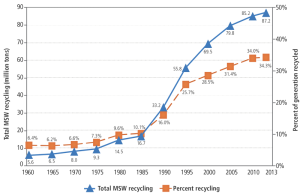The long-term goal of reducing waste has become an ever increasingly conscious goal of our generation, as environmental sustainability and responsibility have become a contemporary societal goals. Despite the increasing prevalence of responsible waste techniques like recycling and composting, waste production has reached an all-time high with each American producing an average of 4.4 pounds of trash per day, contributing to a total national waste production of 254.1 million tons of wastes per year [1].

United States solid waste statistics between 1960 and 2013
Although recycling is a common practice, it is still not accomplished with maximum efficiency, and composting is even less common in areas where it is not legally mandated. Food scraps and byproducts that could otherwise have been broken down in proper composting methods continue to pile up in landfills where they breakdown into methane gas that rises into the atmosphere, where it contributes to the greenhouse effect in an even more dramatic fashion than CO2. [2] In the plot below, provided by the United States Environmental Protection Agency, we can see that even at all-time high, our country only recycles about a third of the generated waste. [1]
United States recycling statistics from 1960 to 2013
The household waste tracking system aims to increase the sustainability and personal accountability of our consumer society through the quantification of household waste production. Like so many other facets of our lives, data and the knowledge attained from that data are the keys to reducing the impact of post-consumer waste and moving towards a better future. By implementing a household waste tracking system we will be able to generate individualized and big data that will allow us to incentive responsible waste, as well as optimize the waste collection process. Using the data generated from individual waste bin collections, local governments and waste management businesses can offer tax cuts, reduced pricing for responsible waste, or other financial incentives and subsidies to stimulate societal motivation. This motivation will cause consumers to not only take serious consideration of waste practices, but also modify greater shopping habits so that market goods become more environmentally responsible as a whole. Large scale location data, when tied with individual waste reception and time data will generate information on waste trends allowing waste management companies to tailor waste collection routes to reflect the habits of their customers. These smart waste collection routes will reduce the number of vehicles, and miles driven to complete the job, ultimately saving the company money and the environment by reducing fuel expenditures.
Although the aim of this project is not that of legislative or financial reform, ideally this system would be used to create a measure by which waste disposal costs are directly correlated to the amount of landfill waste disposed. Federal subsidizing or billing manipulation on the part of the waste management services could easily create a system by which customers become financially responsible for their waste habits. Additionally, this report will not analyze the deeper economic effects of the Household Waste Tracking System. The goal of this design project is ultimately focused on providing a system by which to gather the data that could be used to make these financial political opportunities possible. This report will discuss the background of the project, the design requirements, the history of the project and final implementation, as well as the projects performance, cost and operation.


